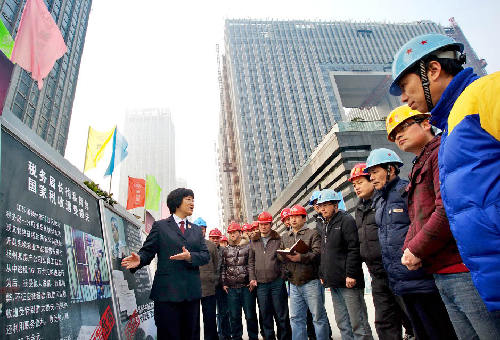Jiangsu Province Procuratorates: Safeguard Justice and Serve the People
Xu An is procurator-general of the People’s Procuratorate of Jiangsu Province. In his view, people working in the procuratorial field must be close to the masses if they are truly to serve the people. He believes that the populace is the ultimate source of truth. “Receiving visits and addressing people’s complaints and difficulties constitutes the duty of a procuratorate. We can do a good job only when we have the people’s well-being at heart,” Xu said.
Xu has long stuck to the practice of grassroots level visits and personally dealing with hundreds of letters from people each year. He often reminds procuratorate workers that these letters show people’s trust in them, which they stand to lose unless they give them their full attention.
Xu’s work style of making himself an example has brought about a trend in the provincial procuratorate of being close to everyday people.
“Staying close to the people” is the principle that Zhou Enlai, first Premier of the People’s Republic of China, lived and worked by. It is also the legacy he left to his hometown Huai’an, and which is deeply embedded in the hearts of procuratorial workers there. In early 2011, Cheng Jixi, then newly appointed chief procurator of Huai’an City, proposed 15 specific requirements on maintaining close contact with the populace. He advocated the Huai’an procuratorial spirit, with Premier Zhou’s principle of “being close to the people” at the core, setting himself up as an example to his peers in this and other fields. Main leaders of Huai’an City Procuratorate are required to personally guide their staff’s handling of cases. They are also expected, through visits to local communities and villages, to deal directly with problems that local residents raise. Cheng Jixi sets the pace in the procuratorial evening school by attending various training schemes. Huai’an City Procuratorate has also set up 39 procuratorial workstations in townships to better serve the people’s needs.
Visits from everyday netizens in Changzhou City to the local procuratorate are commonplace. It was in July 2011 that Changzhou City Procuratorate first invited netizens of zhong5.cn and cz001.com.cn to visit its offices and training bases. The aim is to enable more people to understand the functions and work process of the procuratorate and to express their opinions and suggestions. It thus placed procuratorial work under social supervision by letting local residents observe on-the-spot court sessions, raise questions, and get briefings on the functions and work process of the procuratorate. In recent years Changzhou City Procuratorate has set out to be more creative with regards to social management innovations. It has published its 10 commitments to the public, set up a service hotline specifically dealing with people’s livelihood, and built a comprehensive service platform that combines on-the-spot reception for visits. It also deals with letters, hotline calls, online reports of offenses and remote video reception. All this is in a bid to strengthen its handling of requests and letters of complaint. The procuratorate also helps impoverished victims of criminal cases and has jointly established with the city’s other governmental departments the country’s first “coordinated law enforcement center for environmental protection.” Along with the 13 procuratorial offices and the 32 workstations set up across Changzhou’s urban communities and rural townships, the city has also established 181 liaison outposts and appointed 200 or more liaison workers. Their tasks are to accept and hear cases, resolve conflicts, prevent crimes and publicize laws within local communities.
Support for certain social groups is part of procuratorial work. Jiang Yong-liang, chief procurator of Wuxi City, advocates putting a premium on grassroots needs and mechanism innovation. Wuxi City Procuratorate has given a helping hand to impoverished victims of criminal cases and migrants that have committed minor felonies and established the country’s first “care base for migrant children and teenagers who have committed minor felonies.” Prompted by the procuratorate’s efforts, in 2009 Wuxi introduced the country’s first Regulations Concerning Assistance to Impoverished Victims of Criminal Cases. The same year, the procuratorate began setting up grassroots workstations and hiring local liaison staff – moves that have both helped its work and promoted the procuratorate’s image and credibility.
Jiangyin (a county-level city) has been among China’s top 100 counties for eight consecutive years in terms of comprehensive strength. Behind its success is the devotion of the city’s 140-odd procurators. In August 2008, Jiangyin City Procuratorate established a care and education base for migrant workers who have committed minor felonies. It is the first of its kind in the country. Since establishment the base has accommodated 502 people, 98 percent of whom qualify for non-incarceration judgements like nolle prosequi or probation. Thanks to the base, migrant worker arrests have fallen 15 percent. The success of the care and education base for such migrant workers has resulted in its inclusion in the 2013 work report of the Supreme People’s Procuratorate.
 |
| Lin Zhimei of Nanjing City Procuratorate takes part in a public awareness-raising campaign on jobbery crimes held on the construction site of the 2nd Summer Youth Olympic Games. |
Services
Economy
- Are You Ready to Perform?
- Beijing’s Green Courtyard
- China’s CSR on the Global Market Fast Track – An Interview with Xu Zongxiang, vice president of China South Locomotive & Rolling Stock Corporation Limited (CSR)
- China’s Changing Development Pattern
- China Accelerates Transformation of Its Economic Development Model
